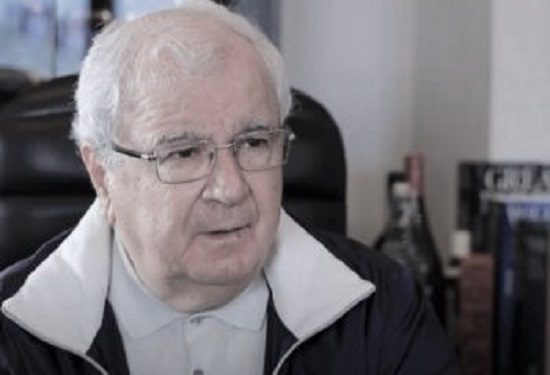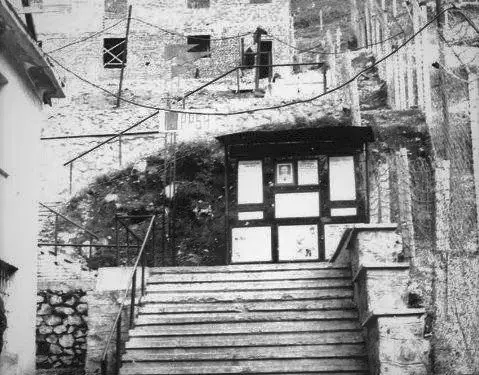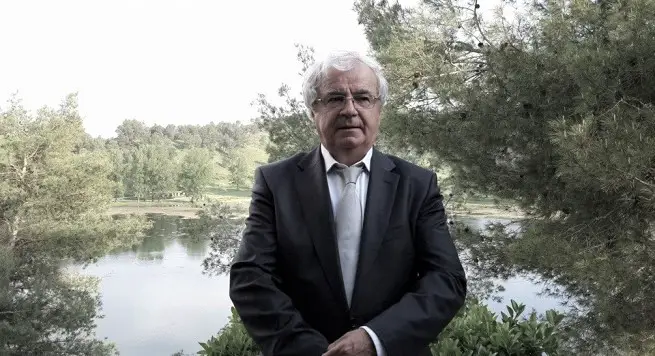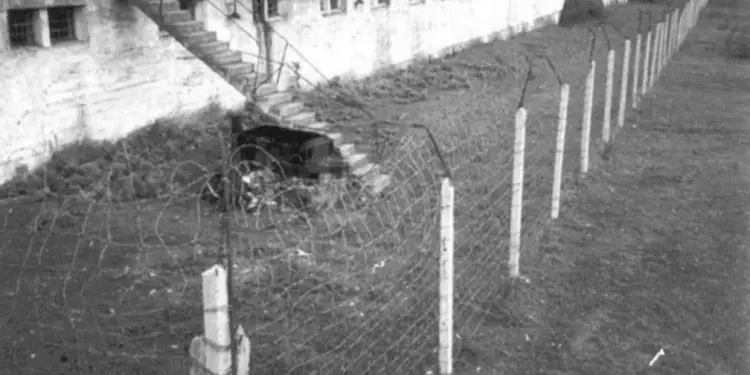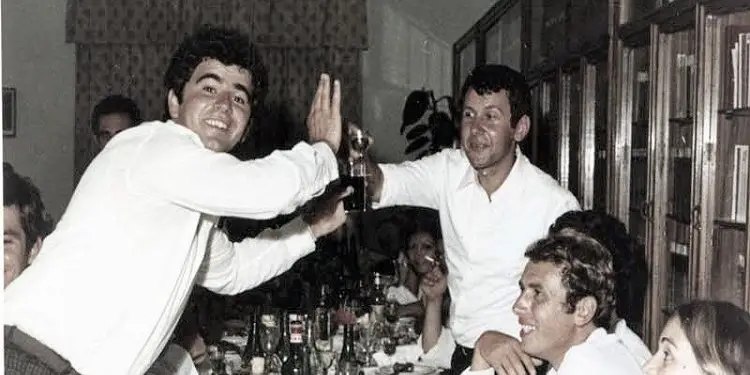From Spartak Ngjela
The first part
Memorie.al / Spartak Ngjela was born in Tirana on July 11, 1948, while the origin of his family on his father’s side is from Zagoria in Gjirokastra, and on his mother’s side, from Pojani in Korça. After finishing high school at the “Petro Nini Luarasi” gymnasium in Tirana (where at that time most of the children of the nomenclature of the PPSh senior leadership studied), Spartaku attended higher studies and graduated in Law at the State University of Tirana. After graduating in 1970, Spartak was appointed as a lawyer (legal advisor) at the district courts of Vlora and Durrës and in 1973, as a scientific worker at the Institute of History at the Academy of Sciences of Albania, newly opened at that time. In 1975, after the arrest of his father, Kiço Ngjela, (former Minister of Trade for more than two decades, who was sentenced to 25 years of imprisonment with the so-called “Economic Hostile-Saboteur Group”, where they including the two deputy prime ministers Avdyl Këllezi and Koço Theodhosi, as well as the minister Vasil Kati, etc.), Spartaku was also arrested, while the family was interned in Selenica, Vlora. Likewise, a few years later, his brother, Sokol Ngjela, (Linci), was also arrested and sentenced “for agitation and propaganda against the popular power” and during the 80s, all three male members of the Ngjela family were sentenced to prison the camps and prisons of the communist regime of Enver Hoxha and his successor, Ramiz Ali. The arrest and conviction of Spartak in 1976, on the charge of “agitation and propaganda against popular power”, did not come simply from the conviction of his father, Kiço Ngjela, but because he himself was one of the “problem children” of the Block. ‘ of the senior leadership of the PPSh, which was proven by the dignified attitude he maintained in camps and prisons during the entire period of serving his sentence (1975-1991), such as in Ballsh and Burrel, where he was constantly in open conflict, not only with the prison authorities, but also with the senior leadership, since from time to time he sent letters to the leadership, such as the one about finding the minutes of the founding meeting of the Albanian Communist Party (where Enver Hoxha did not appear as general secretary), or the letter sent to Ramiz Ali in 1988, where he requested the rehabilitation of Father Gjergj Fishta. Njjela’s stay in camps and prisons, in addition to many of his co-sufferers, is also confirmed by a secret document of the Operative Worker of the Burrel Prison, Piro Nuredini, sent in 1982 to his superiors, where he made several characteristics, for some of the most problematic prisoners for the regime, who were serving their sentence there (such as: Pjetër Arbnori, Spartak Ngjela, Abdulla Sallaku, Gjet Kadeli, Daut Gumeni, Avni Aliko, etc.), where he writes: “Spartak Ngjela, furious against the Party and against command. He is really honest, he dies for England”. Spartacus, along with his father, Kiçon, was released from prison in early 1991, the last prisoners of conscience to be released from that regime’s prisons. In the early 90s, Spartak Ngjela got involved in political life, first with the Legality Movement party, where in the Stability government in 1997, he held the position of Minister of Justice for several months and in the following years, for several legislatures (2001 – 2009) as a deputy and senior official of the Democratic Party of Albania. On December 12, 2008, Ngjela founded the “Law and Justice” party, which he led as its chairman for several years. Likewise, during this period of time, in addition to his law firm as a lawyer, Ngjela has also engaged in the field of journalism, being present with his writings in the daily press and has published several books, such as two novels: “The Cave of murder” (1994), “Helena R”, (1999), “A woman’s revenge” (2018), or “The decline and fall of Albanian tyranny – 1957 – 2010” (2011), in several volumes, etc. The writing that we have selected for publication here is taken from his book, “The Cave of Death”, which is based on real events lived during the period of the communist dictatorship in Albania of Enver Hoxha, in the first years after the war.
Excerpts from the book “CAVE OF MURDER”
The coming night was getting darker, while in front of the city after so many years, the castle shone with lights and no longer resembled that black and lonely stone that had lost time. It now, for the inhabitants of that side, had suddenly come to life, and a sad thought came to their minds as soon as they saw the lights – inside it was known that all those internees were locked up, some skinned in fact, all those people who themselves, with their own eyes, they had seen them from far away that autumn afternoon getting off the trucks and lining up to enter the castle.
And as for the castles, nothing had changed, because in their minds there was no difference between the city they had so near and the whole country: even every point of the globe was to them equally distant from their castle, while they had none little chance of making even a single dent beyond the stone wall. For those people there were only night, day, guards, castles and waiting…!
– STOP”! A guard shouted suddenly, in a deep voice, with such a loud voice that it seemed for a moment that everything was uprooted. It was the first scream of that night, that’s why it made such an impression. It then, as if absorbed by the stone of the castle square, rumbled there for a little while, until it slowly spread like an echo and was heard. The first calm fell again on the square, which was usually only broken by the uniform blows of the internal guard. Gup… gup gup…!
Anyway, they took a few heavy steps, not losing their rhythm at all from the occasional shouts of the soldier’s guards, who, generally, were lengthened with a cast on the sound “a”, to bring out the word completely as a sob: STOP! Repeated and repeated so often this first night from each other:
” STOP”! Shouted the guard above the big gate, then the other one who was there above the wall, where an elbow took the first turn of the castle circle, followed him as well, even louder. And so on, every now and then, from all the stone bodyguards, the stern voice rushed over the barracks of the internees. STOP!
– Oh God! – Katerina Pogu muttered to herself from time to time, listening to them. She wasn’t used to those piercing screams, so they seemed to her exactly like some orders of death-fire, for example, a wild scream that finally gave the command to the firing squad, right behind her, among the crackles, fell on the ground, all the shot, massacred, there, why not, even there at the foot of the cold wall of that castle.
But most of the internees did not even ask about them. They were used to it and it seemed quite normal to them, like all the actions they were forced to perform during the day. So that they wouldn’t be bothered a little less by the lice that crawled around their bodies day and night! Everything the same, the same thing – like the shouts of the soldiers, like the whistles of the policemen, like the dormitories that smelled of the musty smell – even that piece of bread that was eaten dry or with a little salt. Well, there was no difference at all because life went on the same as when they were used to living quite differently; with fire, bath and washed sheets.
Don’t be upset, Katerina – a well-known woman told Katerina Pogut that day, – don’t be upset at all, because you will see for yourself that very soon, you will get used to it and everything will seem completely normal to you.
But how can a person get used to this hell?! – she once asked herself with all the doubt and shyness as she passed the words of that woman through her mind, and looked so deeply again in the semi-twilight of the bedroom.
All the women and small children were lying down and there was no more noise in the bedroom, except for some sighing or light moaning. Generally, the women interned in that castle were young in age. “STOP!” the voice of the nearby guard was heard for a moment. Oh God! Katerina said again, but still did not take her eyes off the bedroom.
Silence again. The steps of the guard could be heard deep. Everything seemed overwhelmed by loss. Tiredness is sleeping, she stammered deafly, thinking that from now on, every night would be like this – away from life, there, a hostage in a castle where she would slowly be taken away and hope itself; waiting would finally it faded, so as not to be felt almost at all. A slight shiver then shook his whole body, when he thought of himself in such an end. But, right then and there, he suddenly asked him through his teeth in a low voice: what about him?
The next day dawned calmly, as usual, uniformly throughout the entire state, the sleepy people as they were listened to songs, listened to the bells of the clocks, listened to the bells of the churches and went to start the day. In the same way, the residents of the southern town did not break the party before it dawned, although there around 01.00 a “Jeep”, as if enraged, had broken the noise through their town.
In fact, only the old fortuneteller Hane Egjiri heard that scream. And “Frog”, she had cursed lying as she had been in the darkness of her small room, that in the last four years, she had gotten used to the sound of some such cars, which roamed at night to transport the arrested. “Moan your head”, she had said then turning to the other arm between her usual moans that filled the room every night.
But in the Ministry of the Interior, tension rose in the early hours of the morning. In the radiogram addressed to the minister it was said:
“The commander of the internees in the southern castle, Mark Ashta, after taking with him the internee, Katerina Pogu, left with his “Jeep” in the direction of the Greek border. The abduction of the internee and the act of running away happened shortly after midnight”.
Immediately the order was given for a state of alarm in the entire border area: the border was reinforced with volunteer troops, the place where they left the “Jeep” was found, the tracks behind them were identified, and the direction from which the fugitives had taken was immediately determined. . But, what finally calmed down the heads of the Ministry of Interior was undoubtedly the certain fact that, at the border line, there had been twenty-four hours since no violation of any kind had been detected.
In other words, those who fled were still in Albanian land.
– I definitely want that dog alive, – said the Minister of the Interior to Deputy Minister R., just as he was standing in front of him a few moments before the latter took the road to the South, because he would lead the operation for the pursuit and capture of Mark Ashta.
But R. didn’t answer him, he could only see his minister in the eyes and, from the way he stood in front of him – almost certainly – from the completely suppressed gestures he made when he left (a slight bow of the head, a back a few steps to the door, always standing facing the minister), as well as her: “Good day, fellow minister”! that he expressed humbly and in a special tone, it was clear to the square how seriously he had taken the special task that was being assigned to him that morning at 07.30.
In truth, he had never loved Mark Ashta, never, and if it was up to him, Ashta would not be able to set foot in the Ministry of the Interior. What to do to the minister! Ah, why didn’t you hear me?! What, this bad guy had thrown the donkey’s brains at him and now, he did it. Therefore, you should go to the southern city as soon as possible.
– Sofo! – He spoke to the driver, – quickly Sofo because we don’t have work waiting for us… you have to walk as fast as possible.
Then he began to think about the event again.
That dog was beautiful, everyone said once, remembering so well the photo of Katerina Pogu, as he had seen it on the minister’s desk. Catherine Pogu. Had Ashta already known that beautiful woman? An old love, maybe, that we didn’t know about. And how can you know the roots of such people! Eh! He sighed and again his mind went to the picture of the beautiful woman.
Well, there are men who sleep with such women. And they have not thrown a rifle in the war! Neyse, Mark Ashta, what is the truth, had fought. That woman came to her senses. As beautiful as she was, anything could happen. But now, if she was caught, Ashta would end up on the rope for high treason.
– Quickly Sofo, quickly! – Shouted once again to the driver, – that we are running out of time, you hear?
The driver again did not answer.
Eh, Mark Ashta, Mark Ashta – he said after noticing that the car started to go a little faster – I knew you wouldn’t be able to stay long with us. And maybe you say that he wanted to transmit that expressed thought to the movement of the car. Yes, yes, he said then, I knew what was wrong with him. Oh, how many times he had doubted Ashta, that there were not a few times when he encountered her. And it’s not that you didn’t see him as a learned man, no, on the contrary, that’s exactly why you hated him.
R. himself had been no more than a peasant with four classes. But in the war he had distinguished himself as a Brigade Commander, well, it was not a little. Even Mark Ashta had shown bravery in the war, but he was not of the class. And how could he trust an intellectual who had finished school in the West. That was the weak point. Intellectuals should never have been called to power. Never! That this will then be our death.
They don’t love us, they despise us, but we are in our power, so we have to show them our place. What were we? Some villagers who were used to sleeping on mats, but now we have everything, everything, and everything we need: we have villas, we have cars, and we have good salaries. What about this one? Here is some bad boy like this, they despise us. And in the Ministry of the Interior, he knew that everyone viewed Ashta with suspicion.
In the end, he was right: what was the need for him in the Ministry of the Interior, when it was known that he had completed his studies in history. And where look… in Italy. Come on, come on! He muttered through his teeth and took a deep breath, because in those moments he had felt a jolt of satisfaction inside: everything was going to be alright.
Well, little by little the matter would be clarified. Day by day it was being proven that it was impossible for the intellectuals to remain loyal to the revolution until the end. That’s why he and his classmates had to definitely unite as a body, never to allow intellectuals to penetrate the leadership of the party.
“Life should be unbearable for intellectuals” – the Minister of the Interior had told him, a few days ago; and then R. immediately understood that the war against them was fierce, especially up there, in the bosom of the big ones, where the position of the Minister of the Interior was being strengthened day by day.
And in the end, we have the keys to power, he murmured, playing from the country as if revolted, so we can exterminate anyone we want: because now it is clearly seen that the shadow of doubt is spreading throughout the country . No one, except us, the employees of the Ministry of the Interior, will be safe.
But, still, the incident of Mark Ashta, when he thought about it deeply, hurt him like a nuisance, disturbing tis that he was afraid to tear. Who had appointed Ashta to such an important task? That’s exactly what he didn’t like because he knew very well that Mark Ashta had been assigned to that place at the insistence of the Minister of the Interior. Eh, he sighed once, I knew, he thought then, he knew very well that that mask had made the minister for himself. And lo, now the grace I was waiting for has come. What about the minister?
Eh! In fact, R. had placed all his hopes on his minister and on no one else. The party wants him. We love it. The Yugoslavs love him, he thought… because he is classy, he said and sighed again, although he immediately managed to convince himself that nothing, no force could shake the position of the interior minister; that merciless violence had to be exercised against the intellectuals – and all this his minister knew well. That’s why that mascara had to be caught at all costs… Mark Ashta.
He suddenly raised his hand and looked at the clock: it was 08.20. According to the driver, he needed an hour’s journey; an hour and a half maybe. He started dozing off. Memorie.al
The next issue follows




